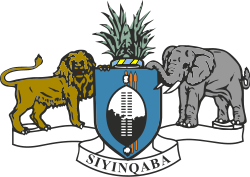 |
|---|
This is a list of finance ministers of Eswatini since the formation of the post to present day.
 |
|---|
This is a list of finance ministers of Eswatini since the formation of the post to present day.
| Name | Took office | Left office | Notes |
|---|---|---|---|
| Leo Lovell | 1967 | 1972 | [1] |
| Robert P. Stephens | June 1972 | January 1979 | [2] [1] |
| James Lawrence Funwako Simelane | January 1979 | November 1983 | [2] [3] |
| Sishayi Nxumalo | November 1983 | June 1984 | [2] |
| Barnabas Sibusiso Dlamini | August 1984 | November 1993 | [4] |
| Solomon Dlamini | 1993 | 1993 | |
| Isaac Shabangu | November 1993 | March 1995 | [2] |
| Derek von Wissel | March 1995 | November 1996 | [2] |
| Themba N. Masuku | November 1996 | November 1998 | [2] [5] |
| John Philip Carmichael | November 1998 | February 2001 | [2] |
| Majozi Sithole | February 2001 | November 2013 | [2] [6] [7] |
| Martin Dlamini | November 2013 | November 2018 | [8] |
| Neal Rijkenberg | November 2018 | Incumbent | [9] |